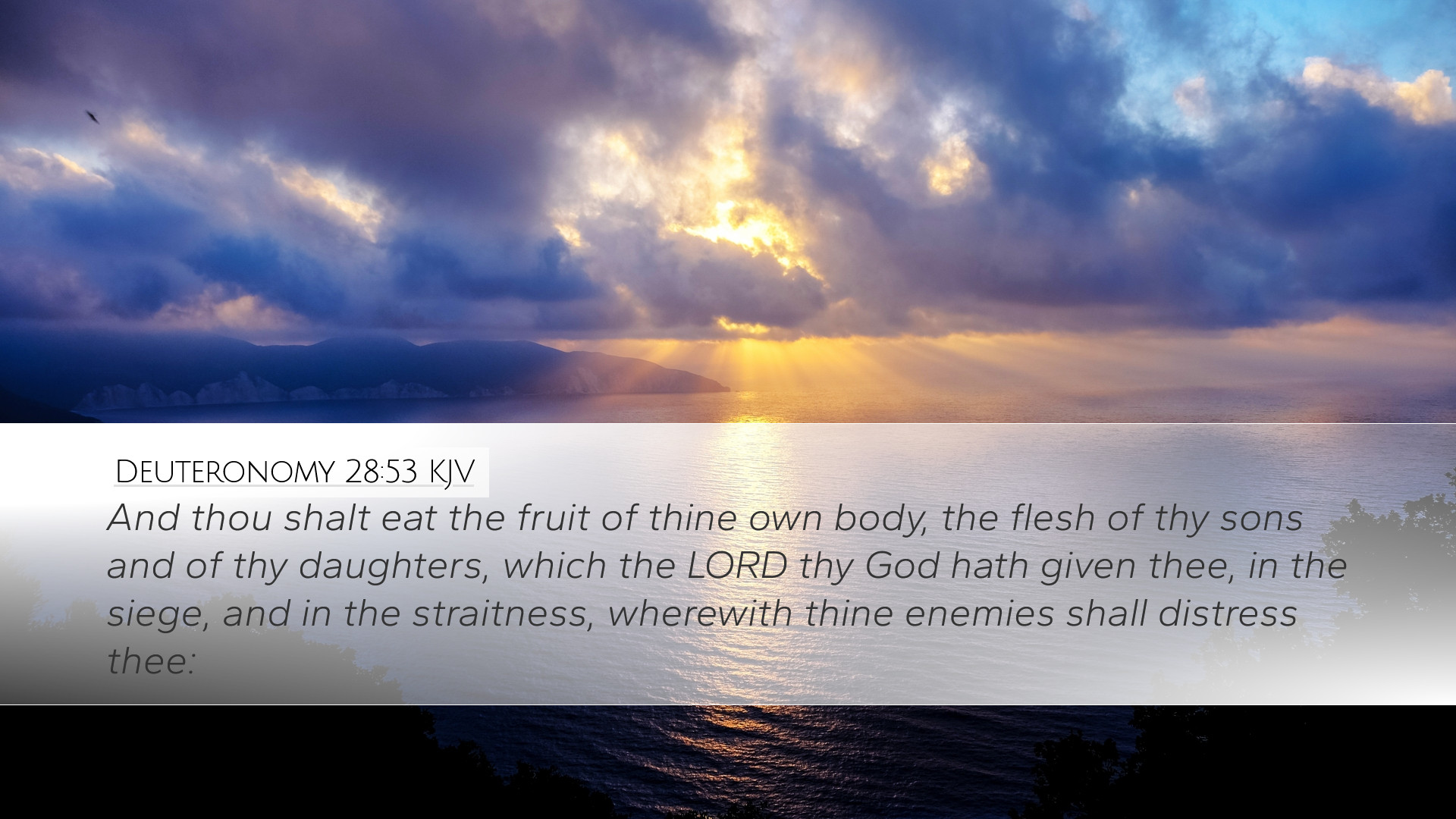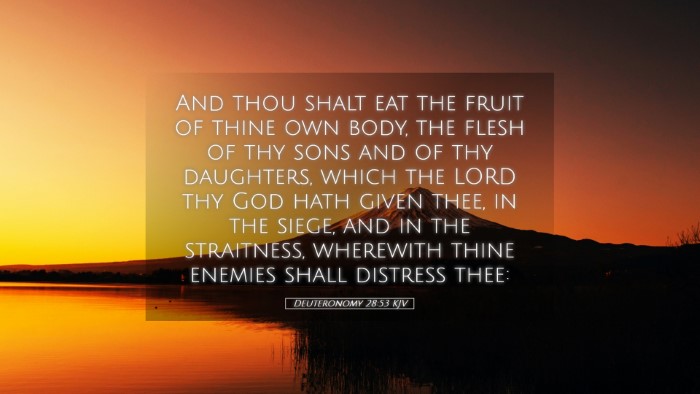Commentary on Deuteronomy 28:53
Bible Verse: "And thou shalt eat the fruit of thine own body, the flesh of thy sons and of thy daughters, which the Lord thy God hath given thee, in the siege, and in the straitness, wherewith thine enemies shall distress thee."
Introduction
This verse from Deuteronomy stands as a stark reminder of the dire consequences of disobedience to God's commands. The context of this passage elucidates the severe afflictions that the Israelites would face should they turn away from God. This commentary synthesizes insights from esteemed public domain commentators to help draw out deeper meanings and implications of this strong admonition.
Contextual Analysis
Deuteronomy 28 serves as part of a larger discourse where Moses outlines blessings for obedience and curses for disobedience. The backdrop of this particular verse speaks to the judgments that would come upon the people in times of siege, a reality for the Israelites during times of national failure and divine judgment.
Exegesis of Deuteronomy 28:53
Matthew Henry in his commentary notes the extreme nature of the punishment described in this verse, emphasizing how it represents the ultimate degradation of a society that turns from God. The phrase "the fruit of thine own body" highlights not only the familial bond of parents to children but also the horrific nature of the actions that the siege would compel individuals to resort to in desperation.
Albert Barnes offers insight into the cultural and historical practices during sieges, illustrating how hardship can drive people to horrific acts—dehumanization and despair eclipse reason and morality when faced with starvation. This aspect serves a dual purpose: it illustrates the gravity of the consequences of straying from God's covenant and warns the people against apathy toward divine obedience.
Theological Implications
This passage raises profound theological questions about the nature of God’s justice and mercy. Adam Clarke states that while God is a God of kindness and compassion, He is also just and must respond to sin with appropriate judgment. This serves as a stark reminder that divine grace is often accompanied by the reality of consequences for sin.
Theologically, it forces readers to grapple with the reality of sin's impact on societal behavior and individual morality. When a community collectively abandons the precepts of God, the resultant societal decay can be catastrophic, resulting in outcomes that reflect a complete breakdown of moral order.
Practical Application
The implications of this verse do not simply reside in ancient history but beckon contemporary believers to consider the nature of societal sin and its repercussions. From a pastoral perspective, it provides a critical lens to understand suffering and consequences in light of situational ethics in contemporary life.
- Awareness of Consequences: This verse should prompt believers to reflect on the trajectory of personal and societal choices and their alignment with divinely commanded living.
- Spiritual Vigilance: Continuous vigilance in spiritual practices can help prevent the gradual blinding to moral decay, recognizing that societal changes often begin with individual choices.
Historical Insights
Henry highlights that the horrors mentioned in this verse were not mere hyperboles; instead, they were exemplified in history, particularly during the Babylonian siege of Jerusalem. Thus, the prophetic nature of Deuteronomy serves as both a forewarning and a historical article against the backdrop of Israel's unfolding story.
Furthermore, Barnes points out that such instances remind modern readers of the sometimes thin line between prosperity and disaster, urging followers to remain grounded in faith amidst changing circumstances.
Conclusion
In conclusion, Deuteronomy 28:53 serves as a powerful testament to the weight of disobedience and its far-reaching consequences. This verse challenges readers to confront uncomfortable truths about human sinfulness and the desperate outcomes of turning away from God. The insights from Matthew Henry, Albert Barnes, and Adam Clarke underline the importance of adherence to God's commands as both a safeguard against personal and communal disaster and a pathway to experiencing the fullness of His blessings.
Reflection
Believers are encouraged to reflect on the grace that exists despite the proclivity towards sin. While the consequences of disobedience are grave, the overarching narrative of Scripture is one of redemption, beckoning each individual back to covenant faithfulness through repentance and faith in Christ.


